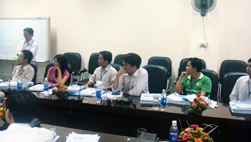Events
2009 Kyoto University - UTC Joint Summer Training Course of Road Infrastructure Asset Management
Date: September 28 - 30, 2009
Venue: Conference Hall / University of Transport and Communications, Hanoi, Vietnam
Organized by:
- Graduate School of Management of Kyoto University
- University of Transport and Communications
Co-organized by:
- Center for Research in Business Administration, Graduate School of Management
- Kyoto University Global COE program "Global Center for Education and Research on Human Security Engineering for Asian Megacities"
Number of attendants: About 30
Report 060
Outline
The “Road Infrastructure Asset Management course” is a part of the joint summer school training course since 2005. This course is aimed at giving 1) understanding concepts and basic theory of infrastructure asset management, 2) obtaining the fundamental knowledge to design and analyze road facilities consisting of pavements, slopes/embankments, bridges and tunnels using LCC considering cost and benefit as decision-making index, 3) understanding how to manage risks in general as well as in construction and operation periods of infrastructure facilities, 4) understanding how to apply the knowledge in practice and 5) qualified participants will be conferred the certificates. Besides, the contents of the classes are changing every year to satisfy most recent trends of the road asset management field. This course is opened to student, researchers and engineers even road administrators in Vietnam who has interest in much advanced road infrastructure asset management theory and practices. To guarantee the quality of the lectures, this course invited qualified experts from universities, research institutes and companies who have rich experiences with advanced technologies and knowledge relevant to road infrastructure asset management. The final goal of this course is growing up the human resources who have deep understanding and knowledge on road infrastructure asset management system. This could be the most fundamental and best strategy that helps the Vietnamese government stand on their own feet by themselves.
Report
In the summer training course, around 30 attendees participated from the first day. First day (28th, Sep.), Prof. Kobayashi made the introduction about the purpose of this summer course and the brief concept of asset management. Afterward, Prof. Nguyen Xuan Dao provides a lecture on Friction Course for Pavement. Next, Prof. Nguyen Viet Trung made a lecture about risk management in context of Vietnamese infrastructures. Next, Dr. Yoshida made a lecture about basic hazard model which is the fundamental knowledge for modeling deterioration process of infrastructures. Mr. Thao, who is a lecturer of UTC, gave a lecture on life cycle analyzing of road pavement management. For the final lecture of the first day, Prof. Ohtsu provided a lecture on Slope and Embankment management. Second day, (29th, Sep.), firstly, Prof. Nguyen Viet Trung made a lecture on bridge management in Vietnam. Next, Dr. Kaito provided a lecture on bridge management using Markof chain model. Afterward, Dr. Takahashi from NEXCO corp. provided a lecture on bridge management system which has been used in Japan. Next, Mr.Sakai who is an employee of Hanshin Expressway Coop. made a presentation about pavement management in context of highway management. For the final lecture of the second day, Dr.Aoki from Pasco Corp. made a presentation about practical examples of pavement management system in Japan. On the final day (30th, Sep. ), Associate Prof. Shiotani gave a lecture on monitoring issues about infrastructures and he introduces some practical monitoring examples using acoustic emission techniques. Next, Mr. Nam who is a Vietnamese Ph.D candidate of Kyoto University provides a lecture on the road asset management in Vietnam, and finally, Mr. Han, gave a lecture on the practical example of pavement management in Korea. After the summer school, every attendee took examination to check their understanding. By the result of the examination many attendees got a certificate jointly issued by Kyoto University and UTC. By the training course, following achievements are expected; 1) Growing human resource, 2) Accumulating knowledge, technologies, experiences and know-how, 3) Enhancing mutual cooperation between governments, organizations, universities of two counties.

